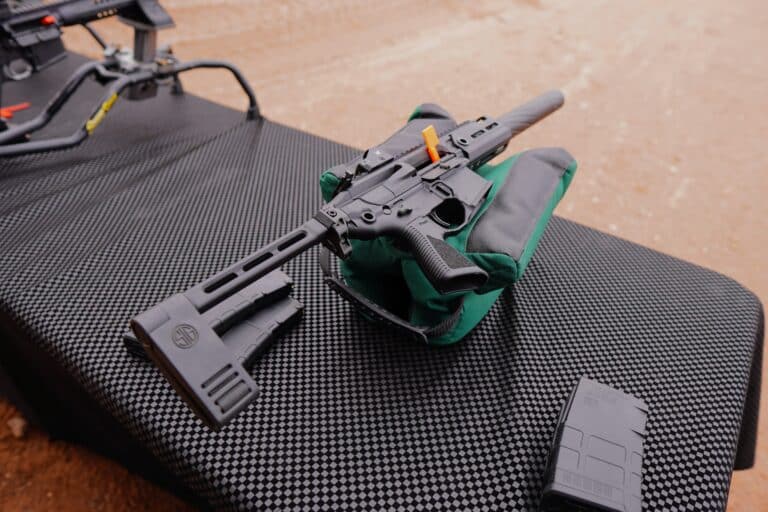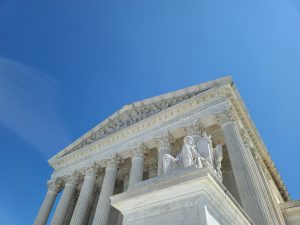The ATF can’t arrest anyone for owning a pistol-brace-equipped gun.
That’s the outcome of a ruling handed down by United States District Court Judge Matthew Kacsmaryk on Wednesday. He granted a motion to stay enforcement of the agency’s rule banning the possession of effectively all braced guns that weren’t registered earlier this year. He found the ATF exceeded its power when crafting the rule.
“[T]he Court is certainly sympathetic to ATF’s concerns over public safety in the wake of tragic mass shootings. The Rule ’embodies salutary policy goals meant to protect vulnerable people in our society,'” Judge Kacsmaryk wrote in Britto v. ATF. “But public safety concerns must be addressed in ways that are lawful. This Rule is not.”
Unlike previous rulings against the ATF, Kacsmaryk’s order applies to the entire rule. That means it could affect tons of gun owners nationwide, with the number of affected braced guns estimated to be in the millions or even tens of millions.
The order comes shortly after the Fifth Circuit Court of Appeals, which oversees Kacsmaryk’s district, found the ban “unlawful.” In August, a Fifth Circuit panel found the ATF exceeded its authority in trying to reclassify guns with pistol braces attached to them as short-barrel rifles that are subject to heavy regulation under the National Firearms Act (NFA) of 1934. It determined the agency moved from regulating to legislating, and the result “must be set aside as unlawful or otherwise remanded for appropriate remediation.”
“The Final Rule affects individual rights, speaks with the force of law, and significantly implicates private interests,” Judge Jerry E. Smith wrote for the majority in Mock v. Garland. “Thus, it is legislative in character.”
The panel sent the case back down to Judge Reed O’Connor who issued a preliminary injunction against the rule as applied to the plaintiffs in the case, including members of the Firearms Policy Coalition (FPC).
“[T]he Court finds that the Government Defendants’ implementation and enforcement of the Final Rule substantially threatens to inflict irreparable constitutional harm upon the FPC members,” Judge O’Connor wrote in Mock v. Garland. “Absent injunctive relief, the Final Rule will impair and threaten to deprive them of their fundamental right to keep and bear commonly used arms as a means of achieving the inherently lawful ends of self-defense. See U.S. CONST. AMEND. II (providing that the ‘right of the people to keep and bear Arms, shall not be infringed.’).”
Judge Kacsmaryk has now taken things a step further in the related Britto case. His ruling stays enforcement of the law as it applies to everyone across the country.
That’s a significant departure from Judge O’Connor’s ruling, where he rejected a request to extend his preliminary injunction to all braced gun owners.
“The Court declines Plaintiffs’ invitation to extend the scope of the injunctive relief ‘nationwide,’” he wrote. “Injunctive relief reflecting that previously afforded by the Fifth Circuit to Plaintiffs is sufficiently limited to ‘not provide relief beyond the parties to the case,’ while also affording sufficient relief to meet each Plaintiff’s present needs.”
The Fifth Circuit panel had also cautioned against issuing a nationwide injunction, a far-reaching type of order the Supreme Court has cast a skeptical eye towards in recent years. However, the panel also noted there were situations where a nationwide effect could be justified.
“Still, in certain circumstances, nationwide relief is appropriate and may be necessary for the benefit of all parties,” Judge Smith wrote. “In Feds for Medical Freedom, for example, the en banc court permitted a nationwide injunction because the organization’s membership numbered thousands, and the members were scattered nationwide. In those circumstances, we reasoned that ‘limiting the relief to only those before [the court] would prove unwieldy and would only cause more confusion.’ Moreover, injunctions should be crafted to ‘provide complete relief to the plaintiffs.’”
Judge Kacsmaryk’s opinion draws heavily from Mock v. Garland and other recent gun cases at the appeals court and Supreme Court level.
“As explained in Garland, ‘[t]he controlling law of this case is that the Government Defendants’ promulgation of the Final Rule ‘fails the logical-outgrowth test and violates the APA’ and ‘therefore must be set aside as unlawful’ under the APA,'” he wrote.
But Kacsmaryk also identified new harms he considered important to address as the case rolls along. Those included the financial impact on both owners and dealers of the affected firearms.
“Additionally, ATF admits the 10-year cost of the Rule is over one billion dollars,” he wrote. “And because of the Rule, certain manufacturers that obtain most of their sales from stabilizing braces risk having to close their doors for good.”
The Department of Justice, which oversees the ATF, did not respond to a request for comment.






